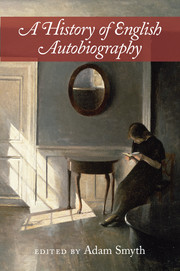Book contents
- Frontmatter
- Dedication
- Contents
- List of contributors
- 1 Introduction: The range, limits, and potentials of the form
- PART 1 AUTOBIOGRAPHY BEFORE ‘AUTOBIOGRAPHY’ (CA. 1300–1700)
- PART 2 RELIGION, GENDER, THINGS (CA. 1700–1800)
- PART 3 THE MANY NINETEENTH CENTURIES (CA. 1800–1900)
- 12 Working-class autobiography in the nineteenth century
- 13 Romantic life-writing
- 14 Nineteenth-century spiritual autobiography: Carlyle, Newman, Mill
- 15 Emerging selves: The autobiographical impulse in Elizabeth Barrett Browning, Anne Thackeray Ritchie, and Annie Wood Besant
- 16 Victorian artists’ autobiographies: Transgression, res gestae, and the collective life
- 17 Victorian print culture: Periodicals and serial lives, 1830–1860
- PART 4 RELATIONAL LIVES AND FORMS OF REMEMBERING (CA. 1890–1930)
- PART 5 KINDS OF COMMUNITY (CA. 1930-CONTEMPORARY)
- Index
- References
14 - Nineteenth-century spiritual autobiography: Carlyle, Newman, Mill
from PART 3 - THE MANY NINETEENTH CENTURIES (CA. 1800–1900)
Published online by Cambridge University Press: 05 March 2016
- Frontmatter
- Dedication
- Contents
- List of contributors
- 1 Introduction: The range, limits, and potentials of the form
- PART 1 AUTOBIOGRAPHY BEFORE ‘AUTOBIOGRAPHY’ (CA. 1300–1700)
- PART 2 RELIGION, GENDER, THINGS (CA. 1700–1800)
- PART 3 THE MANY NINETEENTH CENTURIES (CA. 1800–1900)
- 12 Working-class autobiography in the nineteenth century
- 13 Romantic life-writing
- 14 Nineteenth-century spiritual autobiography: Carlyle, Newman, Mill
- 15 Emerging selves: The autobiographical impulse in Elizabeth Barrett Browning, Anne Thackeray Ritchie, and Annie Wood Besant
- 16 Victorian artists’ autobiographies: Transgression, res gestae, and the collective life
- 17 Victorian print culture: Periodicals and serial lives, 1830–1860
- PART 4 RELATIONAL LIVES AND FORMS OF REMEMBERING (CA. 1890–1930)
- PART 5 KINDS OF COMMUNITY (CA. 1930-CONTEMPORARY)
- Index
- References
Summary
Thus have we […] followed Teufelsdröckh, through the various successive states and stages of Growth, Entanglement, Unbelief, and almost Reprobation, into a certain clearer state of what he himself seems to consider as Conversion. ‘Blame not the word,’ says he; ‘rejoice rather that such a word, signifying such a thing, has come to light in our modern Era’.
Thomas Carlyle, Sartor ResartusThe nineteenth century is often touted as a time of religious doubts and defections: the sea of faith was judged by some English observers to have receded, while orthodoxy proved too constraining for others, and a troupe of Oxford dons and their pupils made the (once unthinkable) voyage over to Rome. But, as religious historians have reminded us, this was also the age of evangelicalism's ‘dominance’, perhaps even ‘the Evangelical century’. Evangelicalism went mainstream in the nineteenth century, shaping not only its devout adherents but English culture broadly. As historians such as Boyd Hilton and David Bebbington have shown, evangelicalism had a pronounced influence on nineteenth-century moral, social, political, and even economic thought. Its effects on the literary scene, meanwhile, have been at times underappreciated or misunderstood – in no small part because no practising evangelical now ranks among the period's first-rate novelists or poets. As George Landow has observed, however, evangelicalism nonetheless has a ‘special importance’ to Victorian literature because so many of its major figures – such as Thomas Hardy, John Ruskin, and both Brownings – experienced an evangelical phase and ‘retained many attitudes and ideas, including notions of biblical symbolism, even after they abandoned their childhood and young adult beliefs either for another form of Christianity or unbelief’ (Landow 2014).
This chapter examines evangelicalism's impact on the genre of autobiography in the nineteenth century by considering the cases of three eminent Victorians – Thomas Carlyle, John Henry Newman, and John Stuart Mill. We focus on two issues: first, the authors’ responses to evangelical models of life-writing; and, second, their shared investment in sincere speech and action. On the first point, we pay close attention to the evangelical conversion narrative whose origins lie with the puritans of the seventeenth century and that flourished in the evangelical revival of the eighteenth. Regarding sincerity, we must recall that evangelicalism assigned paramount importance to genuine, heartfelt belief.
- Type
- Chapter
- Information
- A History of English Autobiography , pp. 192 - 206Publisher: Cambridge University PressPrint publication year: 2016



